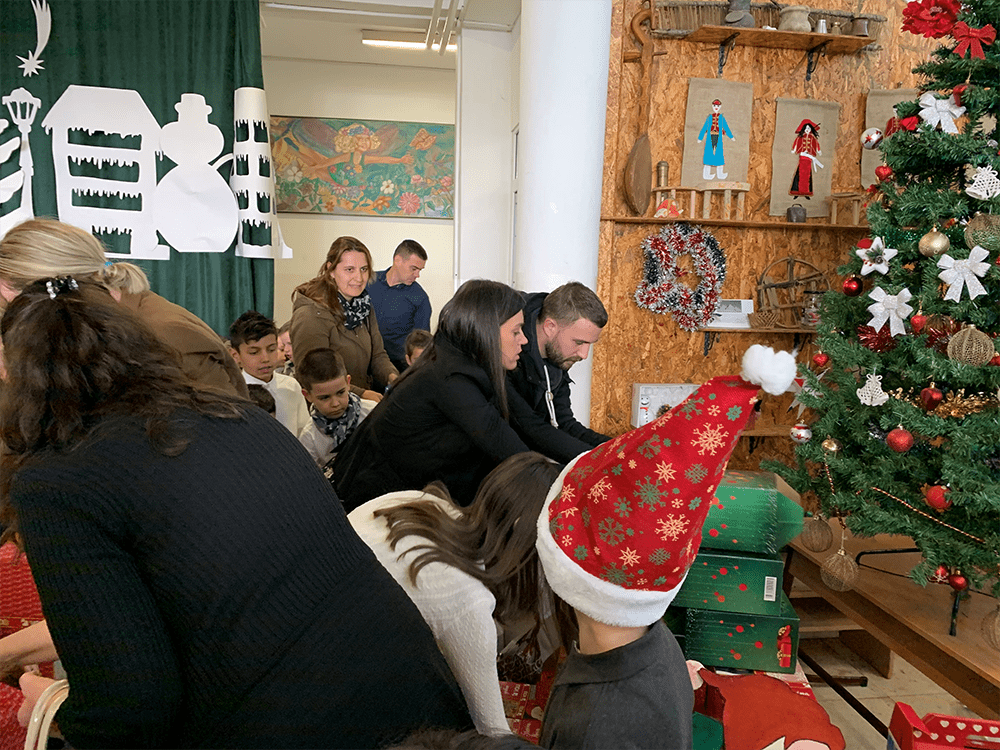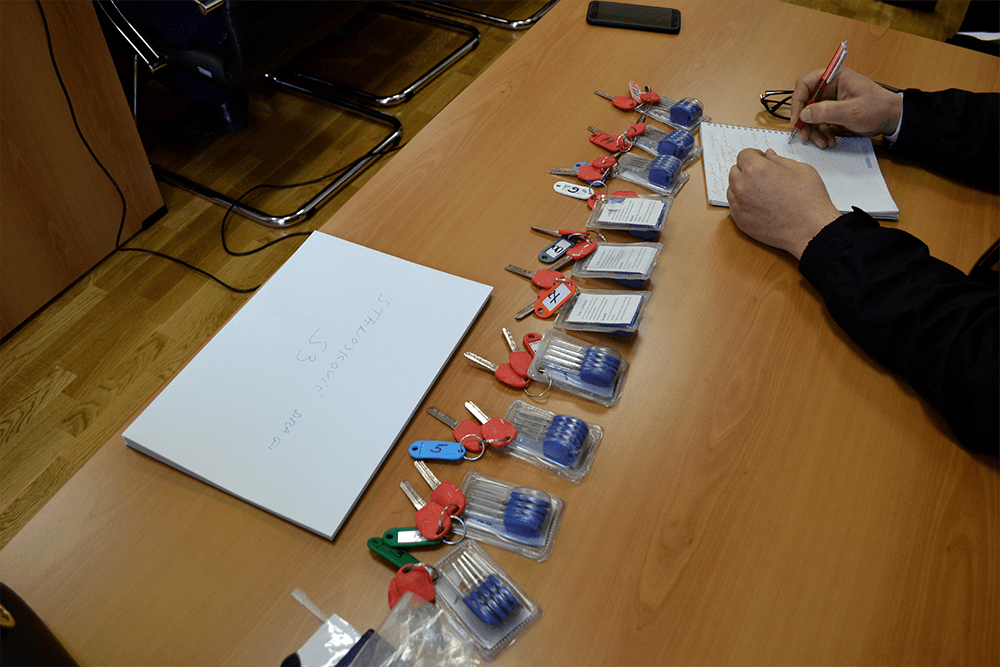Planting of tree seedlings on Children Day in Konik
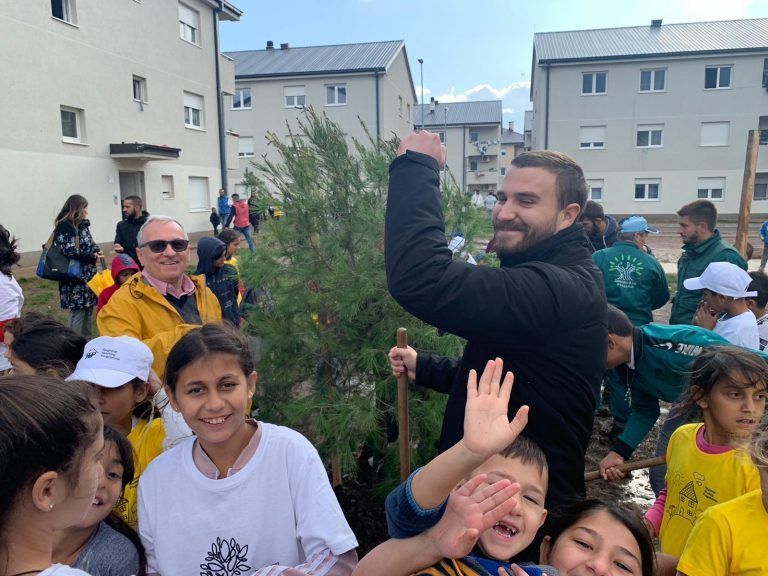
Ministry of Labor and Social Welfare had organized planting of tree seedlings in Konik settlement. The Council of Europe Development Bank had financed the refurbishments of the façade of a building that was built for Roma and Egyptians more than a decade ago in the largest collective housing center in the Balkans. More than 1000 people live in Konik in 220 newly built apartments.
All humanitarian organizations whose focus is on social welfare had participated and each planted their tree on a green area around the settlement. Twenty-seven tree seedlings were planted around buildings built by RHP RHP (Regional Housing project). The event was organized on the occasion of International Children’s Day, November 20, 2019, and the action included cleaning and reviving the environment in that settlement.
Help was among those organizations who planted and paid for new tree seedlings.


New Year presents from Help for first graders
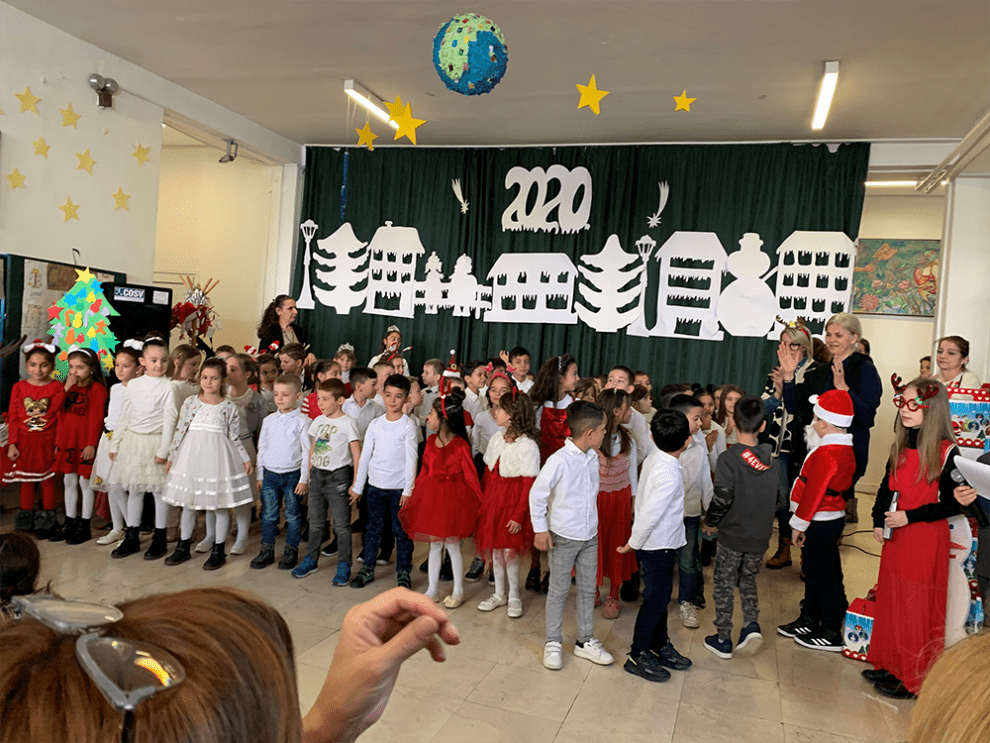
In elementary school „Božidar Vuković Podgoričanin“, in Podgorica, Help has donated New Year presents for first graders from the Roma and Egyptian population. On Friday, December 27, school had a New Year show program, where kids present himself as singers actors and dancer for parents and guests.
Apart from Help, who regularly cooperate with school „Božidar Vuković Podgoričanin“ the Ministry of Science and Educatiotion and few local firm have provided donations for children presents.
Keys for twelve adapted apartments in Danilovgard handed out to beneficiaries
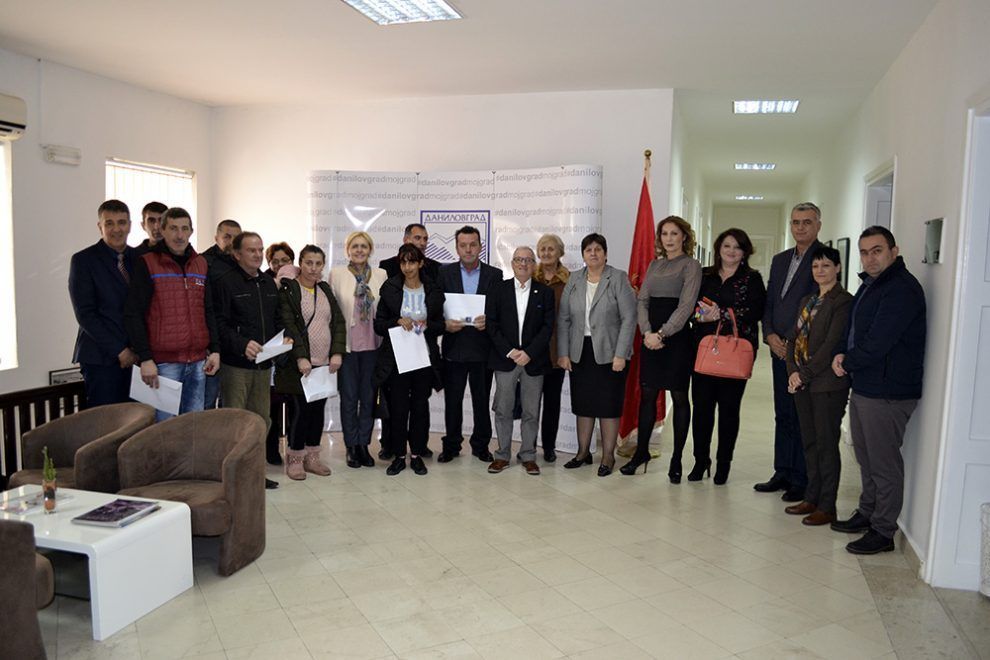
In Spuž, part of Danilovgrad municipality on Thursday, December 19, twelve apartments keys have been given to people in social need: ten- for users of social security care and two for children without parents who upon reaching the age of 18 have to leave the orphanage. The apartments have been built on the top floor of a municipality building.
The keys for the new residents, selected through public competition, were handed out by Zorica Kovačević, mayor of Danilovgrad, Vukica Jelić from Ministry of Work and Social Care, and Klaus Mock, Regional Coordinator of Help in the mayor’s office in Danilovgrad.
In addition to the 12 new apartments, to the satisfaction of all-new and old tenants, the building’s façade, entrance and stairways and other installations were also renovated. The new apartments were equipped with kitchens and household appliances.
The two apartment for children without parents were given to the local Center for Social Care for permanent use.
This is a component of the project “Support for Social-Economy Stability in Region of Western Balkans” with a value of 207.324 Euro. While Help provide 106.808 Euro, the municipality of Danilovgrad with sponsors allocated 65.508 Euro and Ministry of Work and Social Care 35.008 Euro.
The Danilovgrad municipality paid for the revision of the project documentation, monitoring and costs for electricity and water connections.
Help provides equipment and training for Ziks inmates
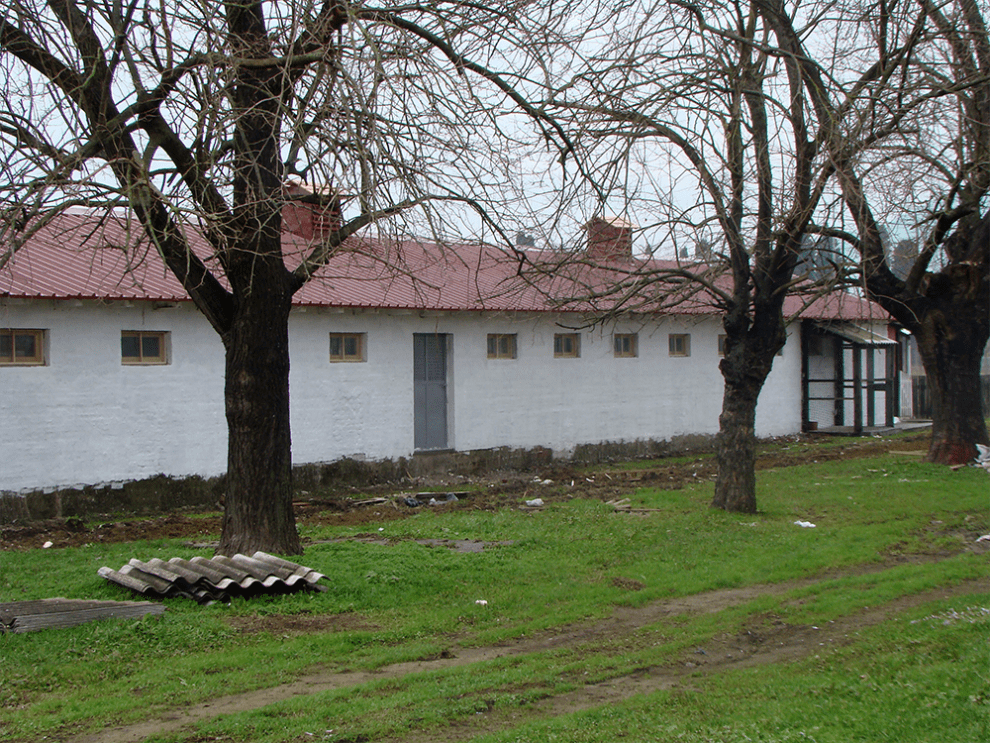
In August 2018 Help started a project in support of the Institute for criminal sanctions-ZIKS, near Podgorica. The project provided for the reconstruction and equipment for a chicken farm in ZIKS with an automatic feeding floor system. The facility has 1500 chicken that were delivered immediately upon completion of the reconstruction works in December 2018. The cost of this component amounted to Euro 56.079.
In addition, Help assisted with the purchase of tools and machines for the carpenter and locksmith workshops, in the value of Euro 4800. The equipment delivered facilitated the implementation of training of inmates. Ten inmates from ZIKS have had vocational training: seven as carpenters’ assistants and two as locksmiths. The training was licensed training and the trainees received certificates. The cost of the trainings was Euro 6.000.
The investment value of this project amounted to Euro 60.878 with ZIKS providing Euro 30.000 and Help covering the remaining part.
Improve access to job opportunities for women and youth in the Northeast of Montenegro
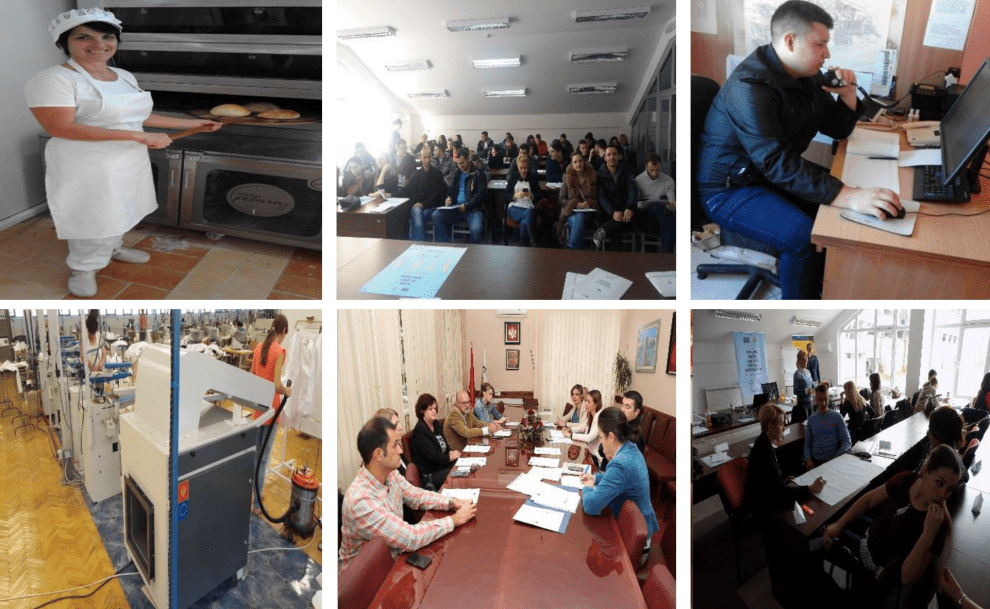
Help implements the project „Improved access to the labour market for women and youth in the Northeast of Montenegro“ ( Link – ‘Improved access to the labour market for women and youth in the Northeast of Montenegro’ ). The overall objective of this project is to help women and youth to find jobs by increasing the number qualified unemployed women and youth with needed vocations and qualifications. In addition, it is planned to strengthen the local employment partnership of all actors important for facilitating access to jobs.
One of the measures to fight unemployment is to organize quality and specialized skills’ trainings in order to reduce the gap between the demand for qualified labour and the existing offer on the labour market that does not correspond with the former. This way, the project will harmonize demand and availability of skills for deficit occupations as required by the market. Attention will be also given to establish a local employment partnership that will include all stakeholders of the local labor market in a working group.
Help and its local partner, the municipality of Berane, expect that this project will produce following results: unemployed women and youth gain knowledge, skills and competences for deficit occupations; the employers’ community will be well informed of the project and well-motivated to participate; a Local Employment Partnership Working Group will be established in targeted area of Northern Montenegro; improved knowledge of local stakeholders on benefits of local employment partnership.
The project value is 170.092,55 Euro with the Ministry of Finance through the Directorate for Finance and Contracting of the EU Assistance Funds (CGCU) providing 150.000 Euro, Help providing 10.458 Euro and the municipality of Berane providing 9.634 Euro. Implementation started in November 2019 and will last until October 2020.
Help new project – Civil society in action promoting and protecting Roma and Egyptian rights in Montenegro
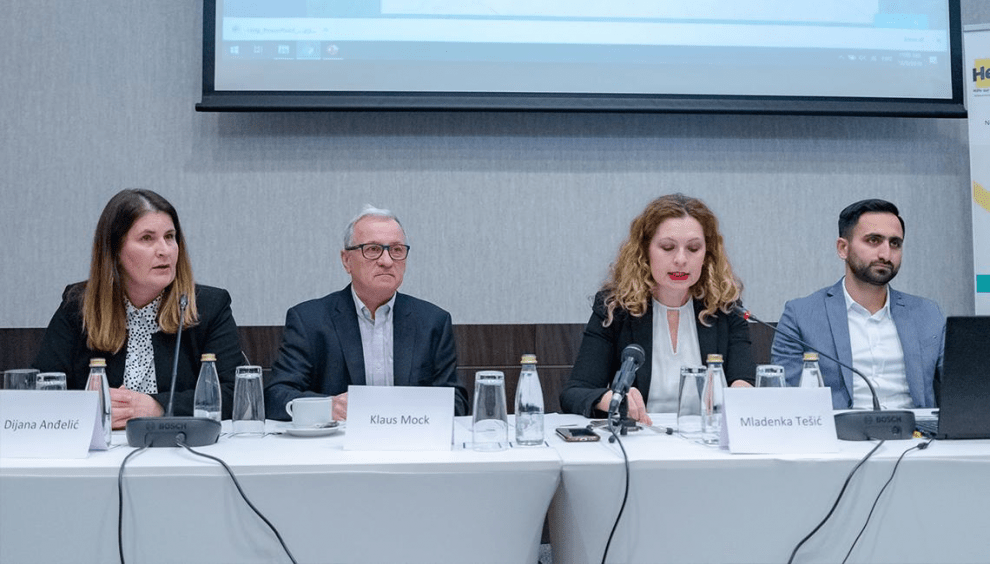
With financial support of the European Union Delegation to Montenegro Help in partnership with Roma’s young association “Walk with Us-Phiren Amenca” has started realization of a project aimed to support Roma and Egyptian population, especially youth and women, to facilitate their access to education, jobs and better involvement in public affairs. Help together with Phirena Amenca implement this project in three municipalities: Podgorica, Berane and Bijelo Polje.
The Task manager for the project in the Delegation of the European Union to Montenegro pointed out that that the Roma communities have been recognized as most vulnerable and most marginalized in Montenegro.
“They are facing great social exclusion and high rates of unemployment, lower education and restricted access of public and social services. Many Roma people live in illegal settlements and very poor living conditions. Participation of Roma in public life is on a very low level, especially among the young population and women. Roma women are exposed to multiple discrimination and this project will aim at active promotion of participation of Roma and Egyptians in all spheres of interest for their communities.“
“It is very important that Roma and Egyptian community members get the opportunity for education so they can more easily find jobs and in that way walk out from the closed poverty circle. I am sure that an educated woman will lead to an independent woman who is strong enough to confront violence and discrimination “, said Anita Beriša and as example she talked about her on successful case. She is one of the laureates of the EU award “Roma heroine”, and now working in the Montenegro Office for EU integration and studies for master’s degree at the University of Donja Gorica.

Šejla Pepić, student of political science, has said that “role of us young people is not to be passive beholders of events, on the contrary, we have to fight for our place in society, so that we can actively participate in building a better future and better perspectives for us Roma and Egyptians.”
Klaus Mock, Help‘s Regional coordinator has assessed that it is possible to see improvement of human rights in Montenegro, but it is necessary for all stakeholders to work a lot more, so that all vulnerable groups can enjoy equal rights.
“With this new project we are continuing our efforts to improve the position of Roma and Egyptian communities, which comprise the most vulnerable groups of population. Our final goal is to capacitate the RE communities to actively participate in decision making concerning their future, make plans for their organizational development as well as for the development of their respective communities, enter into partnerships with state institutions and other CSOs.” says Mock.
The project will promote active participation of the local NGO sector in efforts to improve human rights of Roma and Egyptians in Montenegro. Through a process of establishing working groups and organizations of round tables, Roma and Egyptian women will have opportunities to raise issues that affect their daily lifes and have direct communication with all relevant actors for them.
Social inclusion of young Roma and Egyptians will be achieved through a set of focused activities. Strengthening rules of law and good governance will also be supported through tools for monitoring and overseeing legalization of illegal Roma settlements.
The value of project is Euro 162.941. While the European Union’s share amounts to 150.000 Euro Help co-finances the project with an amount of 12.941 Euro. Implementation of the project started on 13 November and it will last for 18 months.
Help in action for increasing job opportunities for Roma and Egyptians in the North of Montenegro
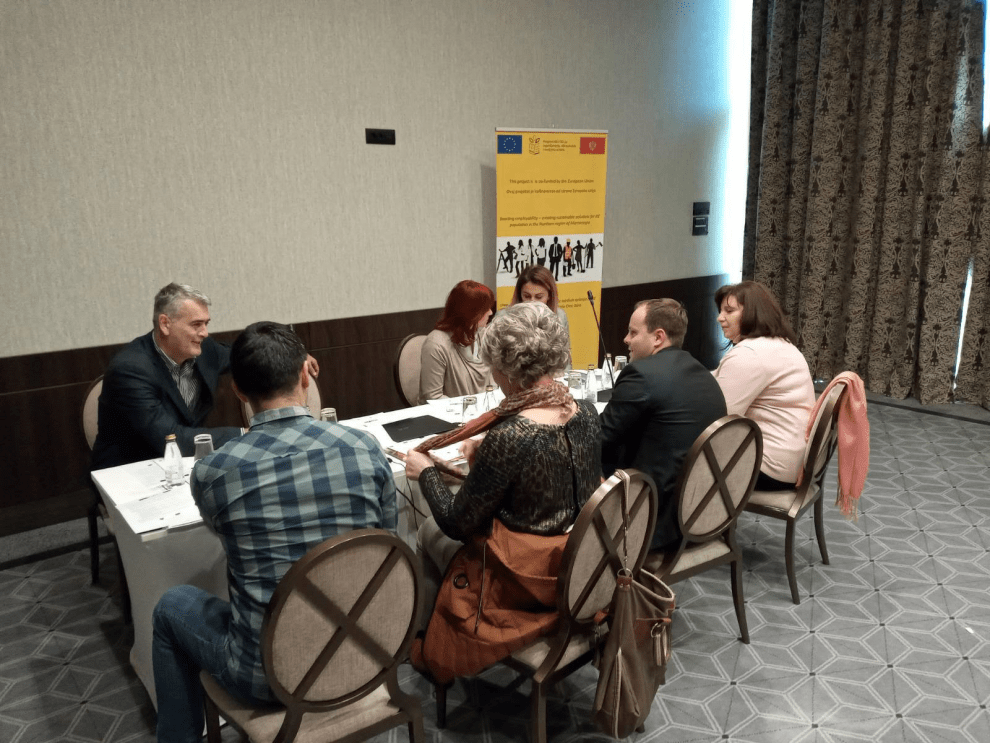
The main goal of the project “Boosting employability – creating sustainable solutions for RE population in the Northern region of Montenegro” is to contribute to the inclusion of Roma and Egyptians into the job market and help in reducing their poverty by improving their professional skills and increasing employment opportunities.
Neđeljka Neda Sindik, Help’s coordinator for the project in Bijelo , expects improvement of access through concrete trainings and encouraging local initiatives for job creations.
“The project will enable jobless Roma and Egyptians to access the job market. Concretely, it will provide professional trainings for 37 unemployed Roma and Egyptians mainly from the northern region at work placses, so that they can improve their skills; this will help to reduce the current structural incompatibility between job market needs and RE qualifications. 10 unemployed RE persons from Berane and Bijelo Polje will have a 3-months vocational training period followed by another 3 months on-the-job training whereas another 27 persons will have the chance for a 6-months on-the job training. Employers will propose the candidates who are best suited to be chosen for the vocational trainings – in accordance with knowledge and skills, as well as needs for deficit occupations. 10 beneficiaries will receive tools and other equipment needed to execute their jobs.
The project will also establish an open local platform for employment with aim of initiating or improving connections between employers, RE community and municipalities”, explained Sindik.
The project value is 122. 564 Euro. Funding from the Ministry of Finance of Montenegro, amounts to Euro 100.000 whereas Help provides Euro 14.134 and the Municipality of Bijelo Polje Euro 8.429.
The Roma Council has pledget its full support for the implementation of this project.
Local municipalities will be represented through their staff and they will have leading role in establishing Local platform for employment.
Support to socio-economic stability of the Western Balkans region 2019-2020

Within the project “Support to socio-economic stability of the Western Balkans region 2019-2020”, the works on upgrading and reconstruction of an existing facility with 12 residential units in Danilovgrad will start in mid-April. This component of the project is being implemented in cooperation with the Municipality of Danilovgrad and the Ministry of Labor and Social Welfare.
Apartments are intended for families who are in a state of social need and belong to the most vulnerable categories.
The contractor is the company “Eurozox” from Danilovgrad, and the expected completion date is September 1, 2019.
Roma mediators from 2017
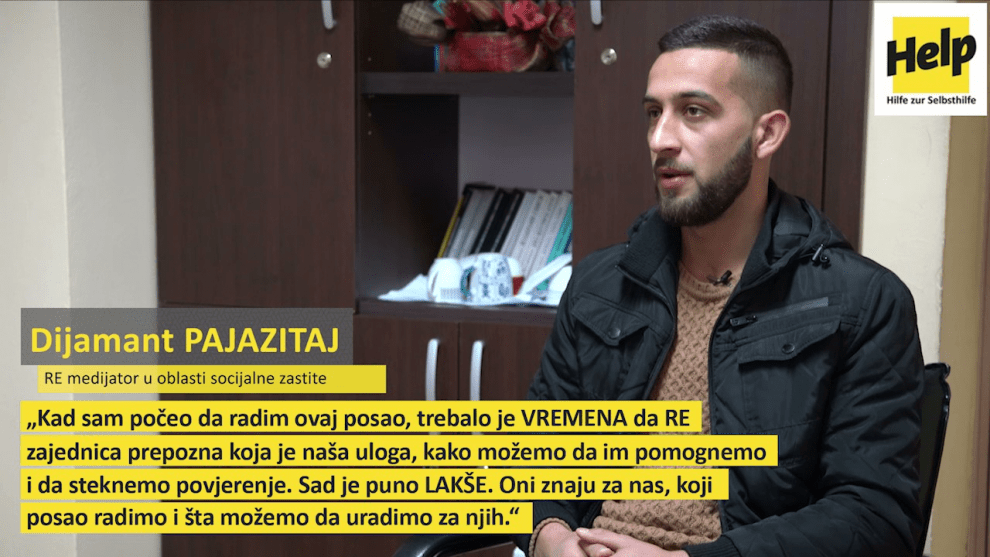
Meet Roma mediators in employment, health and social affairs who have been engaged within Help’s projects from 2017.
https://youtu.be/yFXYvjjdmeU
Certificates for locksmiths and carpenters
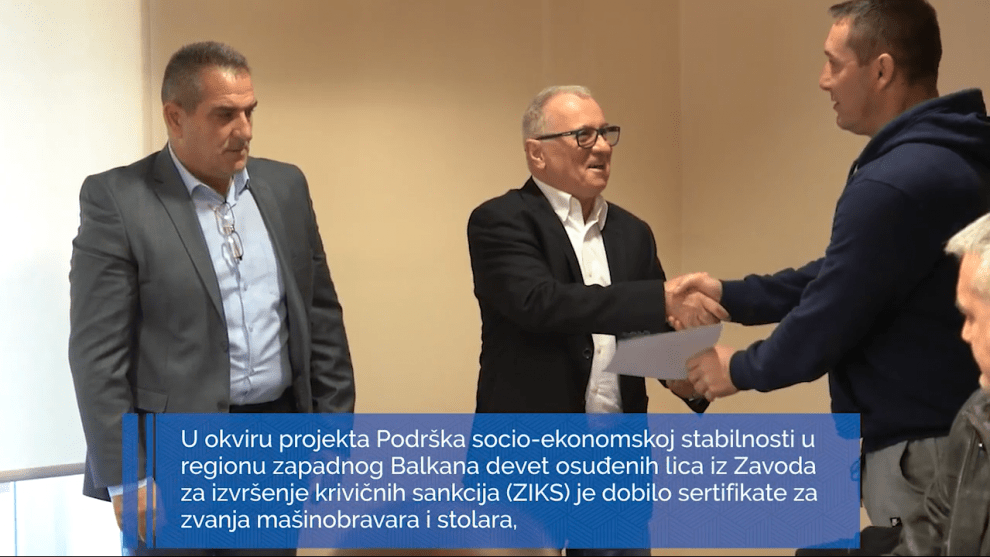
Within the project “Support to social and economic stability in the region of the Western Balkans”, nine convicted persons from the Institute for the Execution of Criminal Sanctions (ZIKS) received certificates for locksmiths and carpenters, enabling them to be competitive in the labor market and increasing the chances of finding employment upon leaving the prison. The project component has been implemented in cooperation with NGO “Juventas”.
https://youtu.be/AShifYZziZo
Help and Roma Council signed the Memorandum on Cooperatio
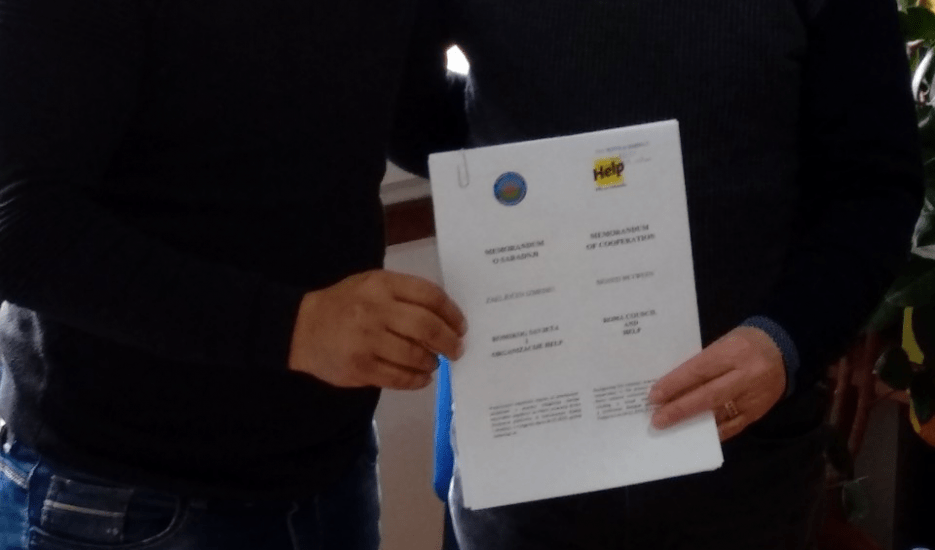
Long-lasting cooperation between Help and Roma Council strengthened by signing the Memorandum on Cooperation with the aim of fostering positions of RE population.

Help starts new programme in Support to socio-economic stability in the western Balkans region 2019-2020

With financial support from the German government Help started a new programme to support the socio-economic stability in Bosnia and Hercegowina, Serbia, Kosovo and Montenegro.
In Montenegro this programme comprises 3 components:
Project component I: Provision of durable housing solutions
The project component in Montenegro is implemented in close cooperation with the municipalities of Niksic, Danilovgrad and Bijelo Polje.
The construction of 2 prefabricated buildings in Niksic has already started in 2018 and will be completed within this new project. 12 newly built flats in the 2 buildings will provide adequate and dignified living conditions for 12 families presently accommodated in barracks in Kapino Polje settlement in Niksic. The beneficiaries of these housing units are social cases, mostly without any income, with multiple health and social problems, which are multiplying on daily basis due to inadequate living conditions. In these families, there are many children with developmental disorders, single parents, psychiatric patients and people with disabilities with first category disability.
The municipality of Danilovgrad has undertaken a number of activities in order to provide durable and sustainable housing solutions for the care of families in state of social need and the most vulnerable categories of displaced and internally displaced persons not covered by the Regional Housing Program living in the territory of Danilovgrad Municipality. Within this programe component a building in Danilovgrad will be adapted in order to create 12 flats. The problem of permanent care for the most vulnerable families has been evident for many years. These families presently live in dilapidated houses that are not suitable for living. The urgency of finding solutions has been recognized both by the municipality of Danilovgrad as well as by the Ministry of Labour and Social Welfare. Two of the flats will be allocated via the Ministry of Labour and Social Welfare to 3 orphaned children who are forced to leave the orphanage in Bijela upon reaching the age of 18.
Both, the Ministry of Labour and Social Welfare as well as the municipality of Danilovrad have committed themselves to contribute also financially to the construction of the 12 apartments.
The municipality of Bijleo Polje confirmed their desire and need for support in the realization of the project “Construction of housing for the accommodation of Roma families in Bijelo Polje in the period from 2019-2020 years”, which will enable them to solve and improve living conditions of vulnerable Roma in the municipality and thus to provide long-term solution of a high quality. It is planned to construct 2 buildings with 10 flats for vulnerable Roma families. In order to stress their determination to arrive at a dignified solution for the housing problems of the Roma population the municipality of Bijelo Polje expressed the readiness of the Municipality to participate in the co-financing of this project.
Project component II- Improvement of the treatment programs in correctional institutions for adults
The Work Sector of the Correctional Facility is an integral part of the overall activities of the Institute for Execution of Criminal Sanctions aimed at achieving the re-socialization and reintegration of the prisoners into the society. The working engagement of prisoners involves working in the Service for the maintenance of facilities, machinery and equipment as well as in production, which is divided into agricultural and workshop production. Agricultural production within the Institute for the Execution of Criminal Sanctions was organized in the field of poultry, cattle breeding and pig-farming. The prisoners are engaged for these jobs, and the obtained products are used for the prison’s needs, as well as for further sale on the Montenegrin market (this mostly applies to carpentry products and sale of eggs in the Egg Store at the entrance to the Institution). In workshop production, prisoners are engaged in carpentry, locksmith’s, carving, tailoring and hairdressing workshops. Help has commenced cooperation with the correctional institution in 2018 when a facility for chicken for the production of eggs was built and 10 inmates received professional training in various professions.
The Action Plan for the Implementation of the Strategy for Execution of Criminal Sanctions envisages measures concerning treatment, labor and employment. One of the strategic measures is the expansion of working activities for prisoners within the prison system, including the modernization and procurement of the necessary equipment for opening new and reconstructing old workshops. It also envisages the improvement of the economic directorate and the working directorate: the establisment of a working directorate that will manage the work, offering jobs in each prison, as well as school and professional development.
Within the new programme it is foressen to organize training for 10 prisoners (5 cooks and 5 gardeners) in cooperation with the Center for Adult Education. Cooks and gardeners are two of the professions in Montenegro for whom exists a great demand. The training would last for at least 3 months and would involve theoretical and practical training by licensed instructors, after which the prisoners would get a certificate. In addition, the correctional institute will receive equipment allowing for increased agricultural production.
Help started cooperation with and support of correctional institutions in 2014 in Serbia. In order to demonstrate the potential and good experiences made in the prisons in Serbia it is planned to organize for the staff of the prison in Spuž a field visit to the prisons in Niš and Sremska Mitrovica. This will enable them to make further plans for development of their institution.
Project component III: Facilitating access to health, employment and social services for RE population
Roma and Egyptians are the most vulnerable national minority in Montenegro that has always been, and is still today, discriminated against. With some 8.500 RE living in Montenegro they are the third largest minority group in the country. The general difficulties that face this population group include: poor living conditions, health problems, unemployment, poverty, social problems and educational difficulties.
Help has successfully introduced the system of RE Health Mediators in Montenegro. 2 RE Health Mediators in Podgorica have already been incorporated into the Montenegrin health system and are now on the budget of the Ministry of Health. Within an EU funded project that started in December 2016 Help has extended the network of RE Mediators by recruiting and training RE Mediators for health in Niksic and Berane. The RE Mediator for health in Berane is already working from within the public Health post in Berane and will be funded in 2019 onwards through the budget of the Ministry of Health.
In addition, RE Mediators for Employment and Social Inclusion were introduced in Podgorica, Niksic and Berane. The introduction of RE Mediators will ensure the overall improvement of the situation of RE population as main target groups and strengthen state and local governments’ technical and management capacities to continue strengthening the position of RE population in the Montenegrin society. Within the new programme it is foreseen to continue with the work engagement of the Mediators for employment and social affairs in Podgorica and Niksic as well as with the Mediator for Health in Niksic.
The total value of this regional programme amounts to Euro 3.590.000. The share of Montenegro in this programme amounts to Euro 586.510.



